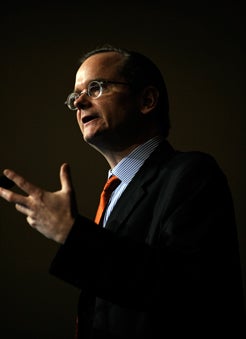The following op-ed by Professor Lawrence Lessig, “A better chance at justice for abuse victims,” appeared in the April 27, 2010, edition of the New York Times.
A better chance at justice for abuse victims
by Lawrence Lessig
Last week, Pope Benedict XVI told victims of sexual abuse by priests in Malta that the Catholic Church was doing all it could to investigate abuse accusations and find ways to safeguard children in the future. With the pope’s pledge, and the resignation in recent days of three European bishops involved in the sex abuse scandal, it might appear that the church is finally taking responsibility for failing to protect children against molesters for hundreds of years.
But the church is not doing everything in its power to help victims. In fact, it is worsening the sins of the past by taking a leading role in preventing abused children from getting the compensation they need to help remedy past abuse.
I saw this behavior firsthand when I represented a victim of child sexual abuse in a case brought against a nonsectarian private school in New Jersey. The trial court in that case had held that a state statute immunizing charities against negligence also protected the school even if its employees acted “willfully, wantonly, recklessly, indifferently — even criminally.”
I volunteered to help appeal that ruling of absolute immunity, and get it reversed. On the other side were lawyers for the insurance company that would have paid the bill if the school had been found liable. Their position was completely understandable: An insurance company has an obligation to its shareholders.
What was truly astonishing was the appearance of the New Jersey Catholic Conference in the case. As its Web site explains, the conference “represents the Catholic bishops of New Jersey on matters of public policy,” because “the Catholic Church calls for a different kind of political engagement: one shaped by the moral convictions of well-formed consciences and focused on the dignity of every human being, the pursuit of the common good and the protection of the weak and the vulnerable.”
Yet the “well-formed consciences” of the conference had not entered the case on behalf of the weak and the vulnerable. The Catholic Conference had filed a brief in support of the insurance company, to defend a rule that would have left institutions — like the church — immune from responsibility even if employees “criminally” protected an abuser.
The New Jersey Supreme Court ruled against the insurers in 2006. But representatives of the Catholic Church have continued their work against the “weak and the vulnerable” here in New York. New York has one of the nation’s most restrictive statutes of limitations for child sexual abuse, requiring victims to sue within five years of turning 18, whether or not they have recognized the psychological harm caused to them by their abuse.
Assemblywoman Margaret Markey, a Queens Democrat, has introduced a bill to give victims another five years to seek compensation, plus a one-year window for victims blocked by the old limitations to now bring suit. That legislation has passed the Assembly three times, yet the Senate has refused to consider it. It has now been reintroduced into the Assembly.
At the core of the opposition to this bill is heavy lobbying by the New York Catholic Conference; according to published reports, the conference has hired top-dollar lobbyists to kill the bill. At least one bishop is reported to have threatened to close schools and parishes in legislators’ districts if they vote for the bill. And as Marci Hamilton, a law professor at Cardozo University, has written, bishops “publicly rail against statute of limitation reform as though it were the equivalent of mandatory abortion.”
If the New York Catholic Conference stops this reform, it will achieve three things. First, it will protect its own wealth. Second, it will assure that potentially thousands of victims who have been abused by priests will have no opportunity for compensation. And third, it will help preserve a system of irresponsibility that makes it too easy to ignore child sexual abuse, because the costs of ignoring it are lower in New York than in most other states.
If Pope Benedict and the church want redemption for the crimes of Catholic priests, there must continue to be confessions of those past sins. But just as important, the church must look at what it is doing today and end its campaign to block the weak and the vulnerable from receiving help to deal with the consequences of criminal sexual abuse.
